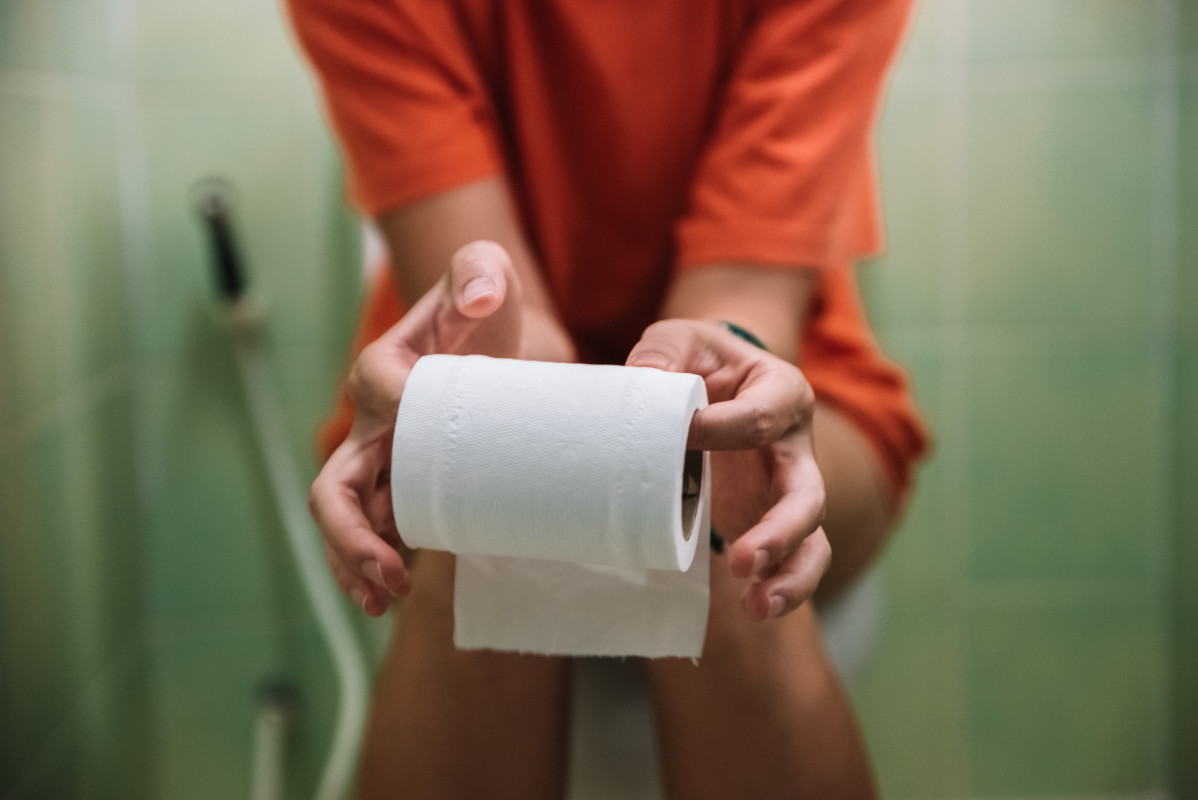
Everybody poops. We were all born with the innate reflex to empty our bowels and have been doing it since birth, so you would think we’d all be experts at it by now. But did you know that there is one common bathroom habit that might be harmful to your health?
Gastroenterologists say they wish people would stop doing this one thing in the restroom because it may lead to a variety of GI complications. However, there are also some healthy habits to incorporate into your routine that may lead to more productivity on the porcelain throne.
Related: Should Your Poop Float or Sink? Gastroenterologists Explain
The One Thing You Should Never Do on the Toilet
When nature calls, it may be instinctual to grab your phone before you head to the loo to enjoy a few minutes of peace and catch up on the latest Instagram reels while you take care of business. However, gastroenterologists warn that this is actually one of the worst things you can do, because it may distract you and keep you on the toilet for an extended amount of time, which can lead to a host of problems.
Advertisement
Advertisement
Dr. Robynne Chutkan, MD, FASGE, gastroenterologist, author of Gutbliss and host of the Gutbliss Podcast, explained, “Sitting too long on the toilet sends a message to both your central nervous system, as well as the second brain in your gut known as the enteric nervous system, that you’ve got all day. That can interfere with the feedback loop between your rectum and your brain that coordinates the movement of the muscles involved in having a bowel movement.”
🩺 SIGN UP for tips to stay healthy & fit with the top moves, clean eats, health trends & more delivered right to your inbox twice a week 💊
Additionally, she says, “It’s important to train your muscles and nerves by sitting on the toilet, trying to expel the stool and then getting off.”
Dr. Lance Uradomo, MD, MPH, an interventional gastroenterologist at City of Hope Orange County in Irvine, California agrees that too much time spent on the toilet can do more harm than good. “Refrain from taking your phone or reading materials with you as these can keep you in the bathroom longer than you need to be and make you lose track of time. Setting a time limit of five to 10 minutes is helpful, and if you haven’t had a bowel movement in that timeframe, then try again at a later time.”
Advertisement
Advertisement
According to both doctors, sitting too long puts an excess amount of pressure on the blood vessels and pelvic floor muscles. It can put you at an increased risk of developing hemorrhoids, rectal prolapse, reduced circulation, pelvic floor dysfunction and constipation.
Related: The 2 Most Important Things Farts Reveal About Your Health
How to Optimize GI Health for a Healthy Go
Aside from avoiding distractions in the bathroom, there are several other ways to improve gut health.
Eat a fiber-rich diet.
Fiber plays an important role in stool consistency and keeping things moving through the GI tract. Women should aim for approximately 25 grams of fiber per day while men benefit from closer to 38 grams per day. Adults over the age of 50 require slightly less. Gradually increase the amount of fiber in your diet to prevent gastric upset.
Related: 20 Best High-Fiber Foods for Healthy Digestion
Drink plenty of water.
Fluid needs vary based on age, sex, activity level and overall health. However, as a general rule of thumb, women need about 11.5 cups of fluid while men require a bit more at 15.5 cups per day per The Institute of Medicine of the National Academies recommendations. Keep in mind that this is total fluid volume which can include fluid from other sources like coffee, teas, fruits and vegetables.
Consider probiotics.
Alterations in gut flora can cause a disruption in normal bowel habits. Probiotics may help promote more regular bowel movements, especially for individuals with irritable bowel syndrome, inflammatory bowel disease and those with antibiotic-associated diarrhea. Probiotics can be found in certain foods or in supplement form.
Related: What Are Probiotics and How Do They Help Your Digestion and Gut Health?
Listen to your body’s cues.
Head to the bathroom when you feel the urge. Ignoring it may lead to constipation or more serious GI complications down the line. “Every time you ignore the urge to go, you’re training your digestive tract to be unresponsive,” Dr. Chutkan warns.
Change your pooping position.
Change your position. Squatting is the most efficient position to be in while going number two. A modified squat position can be achieved by propping your legs up on a small bench or other household items to bring your legs closer to your chest, which helps align the anorectal angle and increases intra-abdominal pressure, suggests Dr. Chutkan.
Related: The One Common Public Bathroom Habit to Break ASAP
Move your body to move your bowels.
Get moving! Staying physically active can also help prevent constipation. Exercise helps with maintaining muscle tone including the muscles that help you defecate, like the diaphragm and abdominal wall muscles. Another reason to try to fit in more movement? Research suggests “that a prolonged sedentary lifestyle can be associated with an increased risk of developing colorectal cancer due to the lack of physical activity,” Dr. Uradomo says.
Get your colon checked out if you notice anything off—or if you’re 45 to 75 years old.
If you’ve noticed any new or abrupt changes in your bowel habits, it’s best to get it checked out. If these changes are also accompanied by any red flags like blood in the stool, persistent diarrhea or constipation, unexplained weight loss or abdominal pain, both doctors recommend getting prompt medical attention as those can be a sign of something more serious.
Related: GI Docs Are Begging You to Break This Super-Common Bathroom Habit ASAP
And remember, the United States Preventative Services Task Force recommends colon cancer screening for all adults 45 to 75 years of age. The decision to pursue screening after 75 years old should be made on an individual basis and with guidance from your healthcare provider.
Advertisement
Advertisement
More in Health
So next time nature calls, remember to get in, get out and get on with your business. Try incorporating a few of the recommended lifestyle changes for potential improvements in bowel regularity.
Up Next:
Related: 31 Ways to Relieve Constipation Naturally, According to Experts
Sources
-
Dr. Robynne Chutkan, MD, FASGE, gastroenterologist, author and podcast host
-
Dr. Lance Uradomo, MD, MPH, interventional gastroenterologist
-
“Relationship between haemorrhoidal grade and toilet habits.” National Library of Medicine
-
“Easy Ways to Boost Fiber in Your Daily Diet.” Academy of Nutrition and Dietetics
-
“Report Sets Dietary Intake Levels for Water, Salt, and Potassium To Maintain Health and Reduce Chronic Disease Risk.” National Academies
-
Probiotics Health Professional Fact Sheet. NIH Office of Dietary Supplements
-
Common Causes of Constipation. Harvard Health Publishing
EMEA Tribune is not involved in this news article, it is taken from our partners and or from the News Agencies. Copyright and Credit go to the News Agencies, email news@emeatribune.com Follow our WhatsApp verified Channel




